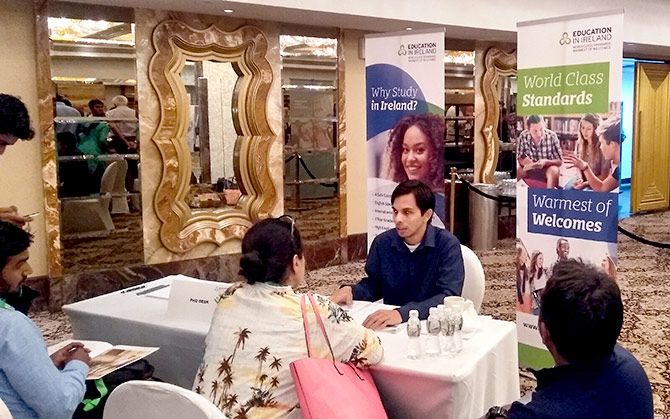'Undergraduate and postgraduate courses for the September 2019 intake are now open for applications.'

College Application Time is here!
Students from across streams in India are examining options to enhance their education profile.
With the rupee falling, Indians are looking beyond the US to pursue higher education.
Ireland is one of the more sought after destinations after Britain, Germany, France and Australia.
According to Barry O'Driscoll, a senior spokesperson for Education in Ireland, the percentage of Indians visiting the country increased by 17% in 2017.
O'Driscoll, left, below, tells Divya Nair/Rediff.com how international students can secure admission at a top Irish college.

Why do you think Ireland is a good country for Indian students?
Ireland is an English-speaking country with a long tradition in education.
All of Ireland's universities are ranked in the top five per cent globally. Ireland's Institutes of Technology (there are 14 of them that go by that name) are renowned for their close links with industry and their highly employable graduates.
The country, much like India, offers a buzzing, multicultural, society, where students will certainly find the highest of education standards and warmest of welcomes.
In fact, Ireland is one of the ten safest countries on earth, according to the Global Peace Index 2017.
How have things changed for students post Brexit in Ireland?
Since the Brexit vote, Ireland's higher education institutions have seen a notable increase in applications and enquiries for higher level programmes from Indian students.
It is expected that Brexit will lead to an increase in international students and researchers choosing Ireland.
The country's membership of the European Union has played an integral role in building Ireland's reputation as a location for orld-class research and as a centre of excellence in higher education.
For the UK, Brexit brings uncertainty over the future of its involvement in international research and serious concerns about losing European research funding and top international academics.
Whereas for Ireland, its strong place in the EU will ensure that Irish higher education institutions continue to access valuable EU funding, and remain at the forefront of research and innovation.
UK universities are now seeing a drop in applications from international students in recent months, whereas Ireland's institutions have seen a notable increase in applications -- particularly from India.
In terms of post-study work opportunities for graduates, Brexit could also present an opportunity for Ireland.
After Brexit, Ireland will be the only English-speaking country in the European Union.
The Irish authorities are currently dealing with hundreds of enquiries from companies, particularly in the financial services sector, considering to relocate from the UK to Ireland in order to maintain access to the European market.
What is the eligibility to apply for a course in a university in Ireland?
The eligibility criteria for each university and course varies, though there are certain general requirements that a candidate needs to keep in mind before applying for colleges in Ireland:
- All Irish institutions of higher education use English as the language of instruction so the student needs to be able to understand, converse and write in English.
- If your native language is not English or your undergraduate education was not in English, then you will have to pass an approved test, before registering for any course, like the IELTS, PTE, ETAPP, GCSE, etc.
- Ireland requires candidates from non-EU countries to have a visa to come and study in Ireland. The student immigration process is divided into two categories, based on whether you are applying for a degree programme offered by a higher education institutions or you intend to pursue an English -- language or non-degree course.
- An important (issue) to keep in mind while applying for a visa is evidence that you have access to sufficient funds to cover your tuition fees and cost of living expenses. You must show you have sufficient funds to support your stay in Ireland without recourse to public funds, or the reliance on casual employment.
- While you may be able to undertake part-time work during your time here, you should not have to rely on this income to meet all your expenses.
What are some of the things students should bear in mind before applying?
Students from non-EU countries are not covered for any free medical attention off-campus and must therefore have their own private insurance.
Please note that heavy levies are charged for all hospitalisation and it is advised to make provision for adequate medical insurance.
Non-EU students are required to show proof of comprehensive medical insurance with an Irish Health Insurance provider when registering with the Garda National Immigration Bureau.
Proof of health insurance is also required when applying for a student visa.
What advice would would you share with Indian students who would are considering studying in Ireland?
- Before applying, you should try to get as much information as you can about your preferred programme, institution and accommodation as well as funding and student visa criteria. Once you are completely satisfied with all your choices, you will need time to gather the necessary paperwork.
- Tuition costs vary depending on the course, the institution and whether you are classified as an EU student or non-EU student. They also fluctuate so make sure to double check the fees with your chosen institution before you begin the application process.
- All international students can assess their own qualifications through the National Framework Qualifications before they take any decisions on study options. The NFQ is a system of ten levels and each of these levels grade all learning from beginner to advanced. It is based on standards of knowledge, skill and competence of the student and it incorporates awards made for all kinds of learning, wherever it is gained. This allows the international students to easily compare qualifications in order to plan their education, training and career progression.
What is the average student mix like? Which country has maximum representation?
There is a large cohort of students from other EU member states studying in Ireland -- France, Spain, Germany and Italy here.
From outside of the EU there are students from the US, Canada, Brazil, Middle East, India and China.
How conducive are living conditions for vegetarians?
There are plenty of food options for vegetarians both on campus or off campus, in local cities and towns. For Indian students, there are plenty of Indian food stores.
What is the best time to apply?
Undergraduate and postgraduate courses for the September 2019 intake are now open for applications.












 © 2025
© 2025